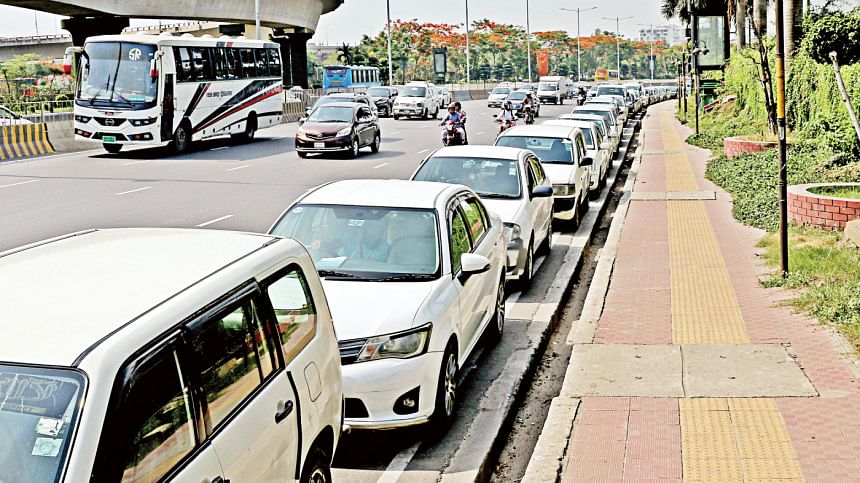Automobile sales drop amid economic downturn, political jitters

Automobile sales have dropped substantially since July this year amidst the economic downturn and political turmoil, denting any hopes of recovering from last year's slump, according to market insiders.
Although credible data is hard to come by, vehicle dealers estimate that monthly sales have fallen by at least 70 percent.
In other words, around 400 to 450 vehicles were sold per month since July compared to 1,700 to 1,800 in the first six months of the year.
One way of verifying sales is through the number of vehicles registered with the Bangladesh Road Transport Authority (BRTA).
Around 1,747 automobiles were registered on an average per month in the January-June period this year. However, data for the subsequent months is yet to be made available.
In 2023, 8,549 were registered in total. The number stood at 23,651 in 2022.
Needless to say, these figures exclude a small fraction of people who delay registering new vehicles.
Although normalcy has been returning since the interim government came to office following the ouster of the Awami League government on August 5, potential buyers may prefer waiting it out a bit longer, according to the vehicle dealers.
"We did not imagine that this type of dull market could suddenly come about," said Shafiqul Islam, head of operations at HNS Automobiles.
"We expected sales to grow this year, but the sudden political change has reversed the calculations of the market," he said.
Besides, the Japanese yen has grown stronger against the US greenback, increasing duties and turning vehicles costlier. Prices have increased by Tk 1 lakh to Tk 1.5 lakh in the last two months, Islam added.
High interest on auto loans is also discouraging purchases while dealers are refraining from releasing imported vehicles from the Chattogram port due to a capital shortage, he said.
Bank loans are also big burdens for vehicle dealers, he said.
Monthly sales have declined by around 70 percent since July due to the political changeover and people's apprehensions about the economy, said Habib Ullah Dawn, president of the Bangladesh Reconditioned Vehicles Importers and Dealers Association (BARVIDA).
Nowadays, people are mostly purchasing sedans such as Toyota Axios and Corollas. The sales of SUVs have been very slow, Dawn said.
Potential customers are taking time to observe the situation before deciding to make a purchase, he said.
Besides, law and order are yet to be fully restored, he said, adding: "If there is a big improvement in the situation, the market will change within the next three months."
According to Dawn, the situation is improving, which is good news for the car market.
He also pointed out that dealers were facing challenges in paying staff salaries and showroom rent due to the drop in revenue.
"We suffered a lot during the Covid-19 pandemic but recovered rapidly, so we are optimistic of recovering from these ongoing difficulties," he said.
Arif Khan Bipu, managing director of Motors Bay, an importer and retailer of reconditioned Japanese cars, said importers and retailers with large-scale operations had suffered a larger drop in sales compared to smaller ones.
According to him, sales of the big retailers declined by 70 percent since July whereas it was around 40 percent for small retailers like him.
He said the overall market situation was not favourable for the purchase of passenger vehicles by middle-income people due to the ongoing transitional period for politics and economic turmoil due to high inflation and high auto loan interest rates.

 For all latest news, follow The Daily Star's Google News channel.
For all latest news, follow The Daily Star's Google News channel. 



Comments